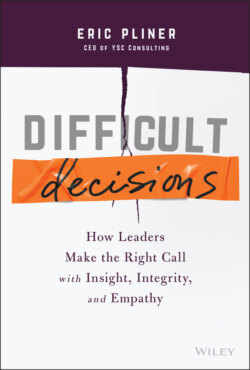Читать книгу Difficult Decisions - Eric Pliner - Страница 9
Making Difficult Decisions
ОглавлениеHow many decisions do you make each day?
What's the toughest decision you've had to make?
Why was it so hard?
How did you ultimately make the call?
Did you get it right?
How do you know?
Our most difficult choices rarely challenge us because we lack information. They're not solved by aggregating data or reviewing spreadsheets or even by using artificial intelligence.
Our most difficult decisions challenge us because they dig at some raw aspect of our humanity: what we believe in our hearts about right and wrong; our hopes and fears about how others will respond to us; and our desire to be good people and to leave legacies that reflect who we believe ourselves to be. They challenge us because they require us to confront conflicts between what we think and what we do, between our view of ourselves as inherently good and choices that mean that not everyone will experience us as good. They require us to recognize that there are few absolutes and lots of nuances. And they require us to recognize that, as the heroes of our own life narratives, we are sometimes the villains in others' life narratives.
By its very nature, leadership – that is, creating the conditions for change in service of generating shared value and meaning – is inherently interpersonal. It requires bringing people together to envision and enable a future that is somehow different from today. Leaders prompt personal and communal growth and development; generate emotional soothing and comfort; inspire new perspectives and ways of being; engender individual, collective, and community wellness, health, and wealth; and help us to know and understand who we are and why we are here.
And because leadership is interpersonal, how we lead today affects real people's real lives right now – and may have consequences for years and even generations to come.
There is a lot for leaders to learn about the sources of and context for our choices, and there is a lot that all of us can learn from other leaders to inform how we make the most difficult decisions of our lives.
Leadership is about tough choices, and making tough choices shows leadership.
We must ask ourselves, then, what kind of leadership we want to show. What kind of leaders – and people – do we want to be? And how does thoughtful, considered conscientiousness and communication about these choices make us better at what we do – and who we are?
It doesn't matter if you think these decisions are right or if anyone agrees – the whole point is that lots of people don't and won't agree. That's what makes these decisions difficult. They are subjective, and subjective decision-making is not helped by pretending to objectivity. We can't do it. We're human, we're fallible. Our lives, identities, and experiences shape the way we see the world. There's no such thing as human objectivity. So then, we want to look to science. Science, after all, can be objective. There are hard facts in the world of science. We follow the impulse to want to rely on something seemingly scientific, seemingly objective. And so we look to things like machine learning and artificial intelligence, hoping that they can somehow tell us what to do about the hard stuff, either forgetting that these technologies are themselves still created and programmed by humans (with all of our biases and fallibilities) and ignoring the fact that they still can't tell us what to do about the really hard stuff – the subjective stuff. An algorithm can give us answers – perhaps even the best answers that do the least harm – but it cannot tell us how a group of humans, each with different backgrounds and identities and experiences, will feel about those answers. And that means that perhaps it hasn't given us answers at all.
There is ample and increasing evidence that the best decisions are made by so-called centaurs3 – part human, part machine – building on the superior analytical capability (and, perhaps more importantly, speed) of technologies and the essential empathy and experience-based intuition of humans.
But they still can't tell us how to feel or what to do when we think something is just plain wrong. That requires us to rely on our judgment – the blend of spotting and recognizing issues (anticipating and responding to the practical environment decisively and realistically); the rigor of our cognition (processing and making sense of complexity, insight, and nuance in a balanced way); and framing (seeing broader themes and perspectives, distilling clarity from ambiguity). Our ability to make those judgments skillfully is informed by what's going on inside of us, what's going on around us, and what we understand is expected of us.
So rather than looking for ways to make decisions more objectively, every one of us who has a difficult choice to make should instead focus on how to build and sharpen the ability to make subjective decisions with greater skill.
